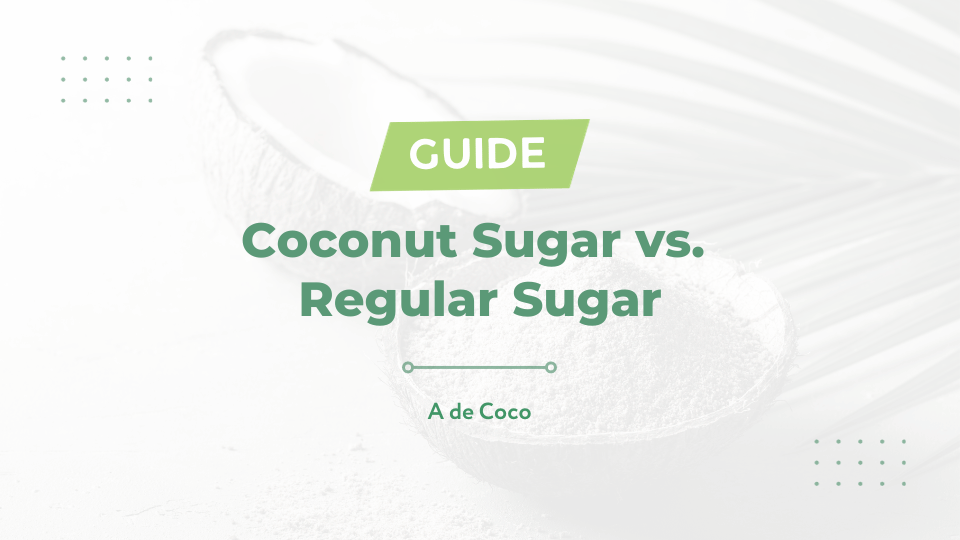The world of nutrition and wellness is buzzing with alternative sweetening options, one of the most popular being coconut sugar, often proclaimed as a healthier substitute for regular sugar.
However, it is crucial to critically assess and comprehend the inherent differences between these two sweeteners before jumping on the health trend bandwagon.
Our discussion will laser-focus on various aspects such as nutritional content, health impact, and overall benefits.
We will also shed light on the potential downsides that accompany each type of sugar.
Thus, equipping you with the necessary knowledge to make an informed decision.
Let’s delve into the subject and find out whether coconut sugar genuinely trumps regular sugar in terms of health benefits or if it’s just another food fad.
Contents
- Coconut Sugar Vs. Regular Sugar
- Nutritional Profile Comparison
- What is the Glycemic Index and How Does it Impact Health?
- Difference in Glycemic Index of Coconut vs. Regular Sugar
- Vitamins and Minerals: What Nutrients are Present in Coconut Sugar?
- Health Impact of Consuming Coconut Sugar
- Potential Risks of Regular Sugar Consumption
- Overconsumption of Sugar
- Final Thoughts
Coconut Sugar Vs. Regular Sugar
Coconut sugar and regular sugar both contain similar amounts of calories and carbohydrates, but coconut sugar has a lower glycemic index indicating slower absorption into the bloodstream. Moreover, coconut sugar also contains trace amounts of vitamins, minerals and phytonutrients that are not found in regular sugar. However, despite these marginal benefits, coconut sugar should still be consumed in moderation as it is still high in fructose which can contribute to health issues like obesity, heart disease and diabetes if overconsumed.
While both coconut sugar and regular sugar possess unique characteristics, considering the broader context of sugar consumption is essential.
Further exploration of this topic will involve a more detailed analysis of not only the nutrition and health implications of these two sugars, but will also delve into the effects of overall sugar intake and how it relates to chronic diseases.
It’s vital to balance these immediate nutritional factors with the long-term health implications of your diet.
Continuing in this discourse, we’ll examine which sweeteners might be more beneficial and the role of natural sugars in our day-to-day life, providing a more comprehensive understanding necessary to make informed dietary decisions.
Extraction Process
The extraction process of both sugars also greatly differs.
Coconut sugar is obtained by tapping the sweet nectar from the coconut tree flower and then allowing it to evaporate.
This is done in a controlled environment, ensuring the nutrients are effectively preserved.
Regular sugar, however, is processed by extracting the juice from sugar cane or beet and then purifying it with a process that involves the application of heat and the introduction of acids and other chemicals.
This method strips regular sugar of any potential nutritional benefits.
As a result, it essentially becomes empty calories with no substantial value other than providing a sweet taste.
Appearance and Taste
Another observation is the differences in appearance and taste between coconut sugar and regular sugar.
Coconut sugar has a brownish color, similar to that of raw sugar.
It also boasts a caramel-like flavor, reminiscent of brown sugar.
On the other hand, regular sugar is bright white with a simple, ultra-sweet taste.
Contrary to common belief, the color of white sugar is not natural but a result of the refining process it undergoes.
Despite these differences, both coconut sugar and regular sugar can sweeten foods and beverages, making them a crucial part of many people’s everyday diets.
Caloric Value and Sugar Content
The caloric value and sugar content of both sugars are also worth noting.
It’s key to remember that both coconut and regular sugar share a similar composition, with both containing approximately four calories per gram, and being predominantly made up of sucrose, which breaks down into glucose and fructose in our bodies.
Nutritional Profile Comparison
When comparing coconut sugar and regular sugar, it’s essential to first understand their basic nutritional compositions.
Both sugars procure their sweet taste from the presence of two types of sugars: fructose and glucose.
Traditional table sugar, derived primarily from sugarcane or sugar beet, is composed of 50% glucose and 50% fructose.
It offers about 16 calories per teaspoon and contains no significant amount of vitamins or minerals.
Coconut sugar, sourced from the sap of the coconut palm tree, has a similar calorie content with 15 calories per teaspoon.
Unlike regular sugar, it offers a trace amount of certain nutrients like iron, zinc, calcium and potassium.
In addition, it also contains a fiber known as inulin that can slow glucose absorption
Traditional table sugar, derived primarily from sugarcane or sugar beet, is composed of 50% glucose and 50% fructose.
This nutrient difference is key when evaluating the health impacts of these sugars.
While it’s true that coconut sugar provides some nutrients in it, its overall nutritional value is still miniscule compared to healthier food choices, like fruits or vegetables.
It’s also important to consider how these sugars are used in our diet; consuming sugar in moderation is the key, regardless if it’s regular sugar or its coconut counterpart.
Caloric Comparison
On the aspect of calorie content, both coconut sugar and regular sugar are almost identical.
Regular sugar presents about 16 calories per teaspoon, while coconut sugar contains roughly 15 calories for the same measurement.
Although this caloric difference might seem insignificant, it can add up over time if massive amounts of either sugar are consumed.
It’s also important to bear in mind that while the calorie count is pretty similar, their nutrient profiles absolutely are not.
Remember that excess calorie intake, no matter where it comes from, can lead to weight gain and associated health complications.
Moderation is always the best approach when it comes to sugar consumption.
Nutrient Profile
While both regular and coconut sugar mainly provide carbs in the form of glucose and fructose, the nutrient profiles of the two sugars differ considerably.
Regular sugar offers essentially no nutritional benefits, thus often being referred to as ‘empty calories’.
Coconut sugar, on the other hand, possesses a modest amount of minerals including zinc, iron, calcium, and potassium which are otherwise absent in regular sugar.
Coconut sugar, on the other hand, possesses a modest amount of minerals including zinc, iron, calcium, and potassium which are otherwise absent in regular sugar.
Additionally, coconut sugar also contains a fiber called inulin that can slow the body’s absorption of glucose.
While these might make coconut sugar seem the healthier of the two, it’s important to remember that the nutritional value offered is relatively minor, and not equivalent to getting these nutrients from whole food sources.
What is the Glycemic Index and How Does it Impact Health?
The Glycemic Index (GI) is a measurement system that ranks foods based on their effect on blood-glucose levels.
Foods with high GI are rapidly digested and absorbed, causing a quick rise in blood sugar.
Conversely, a food with a low GI is digested and absorbed at a slower pace, promoting a steadier rise in blood sugar.
The main advantage of a lower GI is the potential for better blood glucose control and weight management.
This benefit is particularly important for people with diabetes who need to monitor their glucose intake to ensure their levels remain stable.
Additionally, starchy foods with a low GI may help people lose weight as they help control appetite and delay hunger.
Difference in Glycemic Index of Coconut vs. Regular Sugar
The difference in the glycemic index between coconut sugar and regular sugar is notable.
Regular sugar has a high GI rating, typically around 60-65, causing a more rapid rise in blood sugar.
In contrast, coconut sugar has a slightly lower GI ranking—usually around 54.
This lower GI means that consuming coconut sugar won’t cause blood sugar levels to spike as drastically.
However, it’s still important to note that a GI of 54 isn’t low and can still have a significant impact on blood glucose levels.
While coconut sugar may be marginally better than regular sugar in terms of glycemic impact, it’s still not a healthy option for those who need to regulate their sugar intake.
So, when choosing between regular and coconut sugar, remember to consider their differing glycemic impacts and your individual health needs.
Vitamins and Minerals: What Nutrients are Present in Coconut Sugar?
Understanding the nutrient content of various types of sugar can provide greater insight into their potential health impacts.
Coconut sugar, derived from the sap of the coconut palm, contains several nutrients absent in regular sugar.
Regular white sugar, or sucrose, lacks any significant amount of vitamins or minerals due to the extensive processing it undergoes, leaving it almost purely made up of empty calories.
The Nutrient Profile of Coconut Sugar
Despite being a sugar, coconut sugar isn’t devoid of nutritional benefits.
It contains trace amounts of some vitamins and minerals, particularly potassium, zinc, iron, and Vitamin B1.
Another key component of coconut sugar is a fiber known as Inulin.
This fiber has the potential to slow glucose absorption, a factor that may make coconut sugar a more balanced choice for your blood sugar levels.
Another key component of coconut sugar is a fiber known as Inulin.
While the quantities of these nutrients in coconut sugar may seem small, they play key functionalities in our body and are absent in regular sugar.
Note that despite these benefits, the amount of these nutrients in coconut sugar isn’t sufficient to supplement a balanced diet, but rather offer a slight edge over regular sugar.
Limitations of Coconut Sugar’s Nutrient Content
One important factor to consider is the volume of coconut sugar you would need to consume to get significant amounts of these vitamins and minerals.
Due to the high calorie content of all forms of sugar, consuming enough coconut sugar to achieve any meaningful vitamin or mineral intake would lead to an excessive calorie intake.
This could potentially lead to weight gain and other related health issues.
Due to the high calorie content of all forms of sugar, consuming enough coconut sugar to achieve any meaningful vitamin or mineral intake would lead to an excessive calorie intake.
For this reason, it’s unwise to look to coconut sugar as a significant source of vitamins and minerals.
It’s better to make sure you get these nutrients through a balanced diet of fruits, vegetables, lean proteins, and whole grains.
Health Impact of Consuming Coconut Sugar
There’s much to discuss when it comes to the health benefits of coconut sugar.
High in essential nutrients, this natural sweetener is utilized by many health-conscious individuals.
One of the most significant advantages of coconut sugar is its low glycemic index which can contribute positively to regulating blood sugar levels.
People diagnosed with diabetes find coconut sugar to be a more suitable option as their body can handle the slow and steady release of energy.
Coconut sugar possesses a low glycemic index that contributes positively to regulating blood sugar levels.
This makes it a more suitable choice for individuals diagnosed with diabetes.
This assertion is supported by several health studies that indicate a steady, slow-release energy source like coconut sugar can control sugar spikes, thereby managing diabetes effectively.
Moreover, it prevents sudden insulin and glucose surge that could negatively impact the bodily functions.
Additional Health Benefits
Coconut sugar is also rich in vitamins and minerals, thus offering a range of health benefits.
This natural sweetener is packed with iron, zinc, calcium, potassium, and antioxidants, thus enriching your diet.
These nutrients play crucial roles in bodily functions like immune response, bone health, and oxygen circulation.
Among other benefits, the iron in coconut sugar can help prevent anemia while the calcium and potassium contribute to good bone health and heart function respectively.
Coconut sugar, packed with essential vitamins and minerals, can provide several health benefits – combating anemia, promoting bone health, and supporting heart function.
This statement is backed by scientific research that underlines the importance of these nutrients for our overall health.
Daily intake of these vitamins and minerals has been linked with improved cardiovascular health, heightened immunity, and stronger bones.
The Digestive Perks
Another significant health advantage of coconut sugar is its positive effect on digestive health.
It contains inulin, a type of dietary fiber that serves as a prebiotic, fostering beneficial bacteria in your gut.
This can significantly improve gut health, digestion, and may even assist in weight management.
A healthy gut microbiome is linked to many aspects of health, including mental well-being, better sleep, and improved immune function.
Coconut sugar contributes positively to digestive health due to the presence of inulin, a dietary fiber which serves as a prebiotic and fosters beneficial gut bacteria.
There exists extensive research supporting the benefits of prebiotics to gut health, including enhanced digestion, weight control, as well as overall improved health.
Therefore, coconut sugar can be a valuable addition to a balanced diet for its nutritional and wellness benefits.
Potential Risks of Regular Sugar Consumption
It has become common knowledge that sugar consumption has significant effects on our health, especially when overconsumed.
Nonetheless, the specific risks associated with regular sugar intake are often misunderstood or understated.
Let’s delve deeper into this issue.
Regular Sugar’s Contribution to Chronic Disease
The consumption of refined sugar, in particular, has a considerable impact on the risk of developing chronic diseases, such as obesity, type 2 diabetes, and heart disease.
A high intake of added sugars not only provides large amounts of fructose, which can lead to insulin resistance and increased fat accumulation around the abdomen but also leaves less room in the diet for nutrient-dense foods.
Fundamentally, this results in an inadequate consumption of vitamins and minerals necessary for optimal health.
The consumption of refined sugar has a considerable impact on the risk of developing chronic diseases, such as obesity, type 2 diabetes, and heart disease.
This is supported by numerous studies that have shown us the close correlation between high sugar intake and chronic disease prevalence.
What’s more, it’s vital to remember that it’s the added sugars, not the naturally occurring ones in fruits and dairy, that are often the problem.
Impact of Regular Sugar on Dental Health
Did you know that your oral health can significantly be damaged by regular sugar consumption?
When you consume foods or drinks with sugar, the bacteria in your mouth metabolize these sugars, leading to acid production.
These acids have the capacity to demineralize the tooth enamel, leading to dental cavities.
The bacteria in your mouth metabolize the sugars from your food and drinks, leading to acid production, which can demineralize the tooth enamel and cause dental cavities.
Several pieces of extensive research have been conducted on this matter, and their results consistently point out the harmful effects of sugar on dental health.
This is why dental professionals stress the importance of limiting sugar consumption and maintain good oral hygiene practices.
Regular Sugar and Mental Health
Another probable, yet often overlooked, association is that between regular sugar consumption and mental health.
Some research suggests that a diet high in sugar may exacerbate symptoms of mood disorders, such as depression.
Additionally, fluctuations in blood glucose levels caused by high sugar consumption can elicit symptoms similar to anxiety and may affect psychological functioning and mood regulation.
A diet high in sugar may exacerbate symptoms of mood disorders, such as depression.
These studies, while still somewhat preliminary, highlight an important aspect of diet and mental health interplay.
However, more research is needed to fully understand the mechanisms and implications.
Overconsumption of Sugar
Overconsumption of sugar, specifically fructose, can lead to several detrimental health problems.
This type of sugar molecule is a unique issue to address due to its metabolic effects on the body.
Fructose is a sugar commonly found in many foods, including fruits, honey, and some root vegetables.
However, our modern diet has exponentially increased our fructose intake levels due to the prevalent use of high-fructose corn syrup in processed food and drinks.
The Metabolic Impact of Fructose
Unlike other types of sugar, fructose is metabolized by the liver.
When you consume food or drinks high in fructose, the liver gets overloaded and starts to convert the excess fructose into fat.
This process can lead to fatty liver disease over time if taken in excessive quantities consistently.
When you consume food or drinks high in fructose, the liver gets overloaded and starts to convert the excess fructose into fat.
This fructose to fat conversion process doesn’t just cause fatty liver disease.
It also contributes to increased harmful LDL cholesterol levels, increased blood triglycerides, higher blood pressure, and more resistant insulin, each of which are risk factors for heart disease and diabetes.
Obesity and Fructose
Overconsumption of fructose can also contribute significantly to the global obesity crisis.
Unlike glucose another primary sugar molecule, fructose does not stimulate the release of insulin or the production of leptin, a hormone that signals to your brain that you are full.
As a result, overeating becomes easier as the body doesn’t receive the usual ‘stop eating’ signals.
Unlike glucose another primary sugar molecule, fructose does not stimulate the release of insulin or the production of leptin, a hormone that signals to your brain that you are full.
Essentially, consuming excessive amounts of fructose can make it harder to maintain a healthy weight or lose weight, as you are more likely to consume more calories than you require.
This overconsumption leads to fat storage, promoting weight gain and even obesity if prolonged.
Fructose and Chronic Disease
Excessive consumption of fructose is not just connected to obesity—it also has the potential to trigger chronic diseases.
Studies suggest that high dietary fructose consumption may be associated with an increased risk of certain diseases like type 2 diabetes, heart disease, and even certain types of cancer.
Studies suggest that high dietary fructose consumption may be associated with an increased risk of certain diseases like type 2 diabetes, heart disease, and even certain types of cancer.
Ultimately, while fructose in its natural state like in fruits and vegetables is not harmful in reasonable amounts, the challenge lies in the overconsumption, mostly due to processed food and drinks that are high in this specific type of sugar.
It’s crucial to guide dietary patterns towards moderating sugar intake, focusing on consuming sugars from natural sources like fruits, vegetables, and whole grains, and avoiding excessive fructose available in processed foods and high-sugar drinks to maintain a healthier lifestyle.
Final Thoughts
Having dissected the properties, nutritional comparison, glycemic index impact, and health implications of both coconut and regular sugar, it becomes clear that, while coconut sugar holds a slightly higher nutritional advantage, it isn’t necessarily a ‘healthier’ substitute.
Both types of sugar carry risks when consumed excessively, predominantly due to their fructose content.
The key, then, lies in moderation.
Incorporating coconut sugar into your diet could offer a tad more nutrients compared to regular sugar, but mindful consumption is imperative to avoid potential health problems.
Ultimately, treating sugar – whether coconut or regular – as an occasional treat rather than a dietary mainstay, should contribute positively to overall health and longevity.




